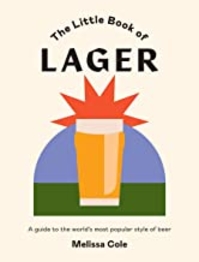Little book with nuggets of beery joy
Added: Thursday, October 29th 2020

The Little Book of Lager by Melissa Cole (Hardie Grant, £10)
This is a cunning little volume. At first sight you expect it to be aimed at drinkers with little or no knowledge of the subject and who cheerfully sup their golden bevies oblivious to the history of the style and how it’s made.
But as you delve into the book you will discover nuggets of information of use to seasoned drinkers and even fellow beer writers. Did you know that Baltic Porters are lagers? Read on...
Melissa sorts the wheat from the chaff. Her critique of the 16th-century Bavarian Reinheitsgebot or Purity Law will raise eyebrows among traditionalists but modern craft brewers will salute her for sorting myth from reality. The law lays down that only barley, hops and water can be used to make beer – yeast was added later when it was scientifically understood. But the Bavarian royal family and nobility didn’t have the interests of drinkers at heart: they wanted to keep their pale wheat beers under their coronets, leaving brown barley-based beers to the hoi-polloi.
The pledge has been declared a restraint of trade by the European Union and in the modern world it’s absurd to stop craft brewers using other grains, herbs and spices in their brews.
Melissa not only takes the reader through the ingredients used in brewing lager but stresses – and this is one of the great strengths of the book – that there’s a lot more to lager beer than the ubiquitous golden variety.
She starts with golden lager, based on the Pilsner style developed in Bohemia and the Helles beers of Munich, but goes on to describe the myriad of other versions. There are Dortmunders – though they are in short supply these days – Bocks, Maibocks, Vienna, Märzen, Dunkel, Eisbock, Schwarzbier and the aforementioned Baltic Porter. Have you come across Zwickel beer in Germany? Read on...
A couple of small quibbles. There’s a section called Hybrids and I agree that Anchor Steam Beer from San Francisco is precisely that: a beer brewed at ale temperature but using lager yeast. But I wouldn’t include Kölsch from Cologne or Alt from Düsseldorf in this category. It’s true brewers in those cities talk of lagering their beers but that is the same as ale brewers in Britain who speak of conditioning, meaning they allow their beers to mature for a week or so to purge them of rough alcohols before going to trade. But both Alt and Kölsch – for me – are members of the ale family.
And Budweiser Budvar gets only a passing mention. I think a brewery that takes great pride in ageing its beer for 90 days and produces, as a result, one of the great golden lagers, deserves more coverage.
But, quibbles aside, this is a joy of a book. Buy a copy and the next time you see someone necking an American Bud or a Stella show them the book and tell them: “Read this!”








